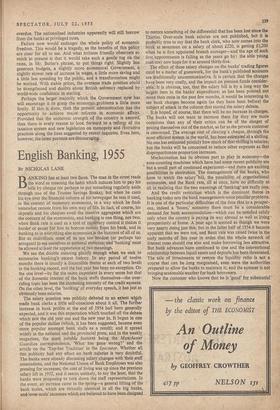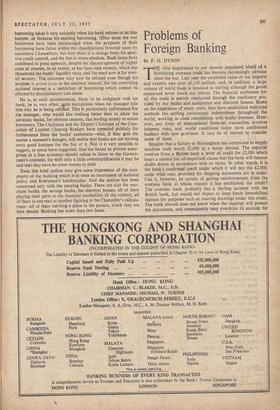English Banking, 1955
BY NICHOLAS LANE BANKING has at least two faces. The man in the street reads the word as meaning the habit which induces him to pay his bills by cheque (or perhaps to put something regularly aside through one of the Trustee Savings Banks); but when he casts his eye over the financial column of his newspaper he sees it used, in the context of monetary economics, in a way which he finds somewhat remote from his own way of life. In fact, of course, his deposits and his cheques swell the massive aggregates which are the concern of the economists, and banking is one thing, not two; when Bank rate is used as a tool of monetary control it makes it harder or easier for him to borrow money from his bank, and in banking as in everything else economics is the business of all of us. But as individnals most of us are too modest (or perhaps too arrogant) to see ourselves as national statistics; and 'banking' must be allowed at least the appearance of two meanings.
We see the double meaning plainly enough when we seek to summarise banking's recent history. In any period of twelve months there is usually a discernible theme at each of two levels in the banking record, and the last year has been no exception. On the one level—by far the more important in every sense but that of the domestic interest of the bank staffs themselves—the over- riding topic has been the increasing intensity of the credit squeeze. On the other level, the 'banking' of everyday speech, it has just as obviously been salaries.
The salary question was publicly debated to an extent which made bank clerks a little self-conscious about it all. The further increase in bank profits at the end of 1954 had been generally expected, and it was this expectation which touched off the debate which saw the old year out and the new year in. It began in one of the popular dailies (which, it has been suggested, became even more popular amongst bank staffs as a result); and it spread widely in the national and the provincial press, and in the weekly magazines, the most notable features being the Manchester Guardian correspondence, 'What has gone wrong?' and the article on the `Top-hat Tradition' in the Spectator. Whether all this publicity had any effect on bank salaries is very doubtful. The banks were already discussing salary changes with their staff associations, and the National Union of Bank Employees was also pressing for increases; the cost of living was up since the previous salary lift in 1952, and it seems unlikely, to say the least, that the banks were proposing to turn down the staff representations. In the event, an increase came in the spring—a general lifting of the bank scales, which are virtually identical in all the big banks, and 'over-scale' increases which are believed to have been designed
to restore something of the differential that has been lost since the Thirties. Over-scale bank salaries are not published, but it is probably true to say that the bank clerk, who now comes into the bank at seventeen on a salary of about £220, is getting £1,200 when he is first appointed branch manager—and the age of such first, appointments is falling as the years go by : the able young man may now hope for it at around thirty-five.
The effect of these salary changes on the banks' trading figures must be a matter of guesswork, for the bank's published accounts are traditionally uncommunicative. It is certain that the changes have 'been very costly, and the impact on pension funds consider- able. It is obvious, too, that the salary bill is by a long way the largest item in the banks' expenditure; as has been pointed out more than once in the past few months, it would be interesting to see bank charges become again (as they have been before) the subject of attack in the column that started the salary debate.
It is hoped, of course, that there will be no increase in charges. The banks will not want to increase them for they are more conscious than any of their critics can be of the danger of pricing themselves out of the market, as far as the private customer is concerned. The average cost of clearing a cheque, through the most efficient system in the world, has been estimated at a shilling. No one has estimated publicly how much of that shilling is salaries; but the banks will be concerned to reduce other expenses as that disproportionate proportion increases.
Mechanisation has its obvious part to play in economy—the note-counting machines which have had some recent publicity are but a small part of continued experiment—and there are exciting possibilities in electronics. The managements of the banks, who have to watch the salary bill, the possibility of organisational economies, and the Bank rate, all at once, have no difficulty at all in realising that the two meanings of 'banking' are really one.
And the credit restriction which is the dominant theme in banking today sets the bank managements some peculiar problems. It is one of the particular difficulties of the time that in a prosper- ous, indeed a 'boom,' economy there must be a considerable demand for bank accommodation—which can be satisfied safely only when the country is paying its way abroad as well as living prosperously at' home. A year ago it seemed as though we were very nearly doing just this; but in the latter half of 1954 it became apparent that we were not, and Bank rate was raised twice in the early months 'of this year in order. that the whole network of interest rates should rise also and make borrowing less attractive. But bank advances have continued to rise and the conventional relationship between liquid assets and deposits has been threatened. The sale of investments to restore the liquidity ratio is not a course that can be long maiptained, even were the authorities prepared to allow the banks to maintain it; and the summer is not bringing seasonable weather for bank borrowers.
Now the customer who knows that he is 'good' for substantial
borrowing takes it very unkindly when his bank refuses to let him borrow, or increase his existing borrowing. Often since the war borrowers have been discouraged when the purposes of their borrowing have fallen within the classifications frowned upon by successive Chancellors; but now there is a change from his selec- tive credit control, and the ban is more absolute. Bank loans have continued to press upwards, despite the discouragement of higher rates of interest, to an extent, as has been said already, which has threatened the banks' liquidity ratio, and the need now is for over- all severity. The customer may now be refused even though his purpose is prima fade in the national interest; for the overriding national interest is a restriction of borrowing which cannot be effected by discriminatory cuts alone.
He is, in such circumstances, likely to be indignant with his bank; he is, very often, quite incredulous when his manager tells him why he is being refused. This is particularly unfortunate for the manager, who would like nothing better than to allow the advance; banks, for obvious reasons, like lending money to sound borrowers. The Chairman and the Deputy Chairman of the Com- mittee of London Clearing Bankers have appealed publicly for forbearance from the banks' customers—who, if they give the matter a moment's thought, will realise that banks are not turning away good business for the fun of it. Nor is it very sensible to suggest, as some have suggested, that the banks as private enter- prises in a free economy should refuse to listen to the Govern- ment's counsels; for with only a little oversimplification it may be said that they have no more money to lend.
Even this brief outline may give some impression of the com- plexity of the banking which is at once an instrument of national policy and Everyman's handmaiden. And the outline has been concerned only with the clearing banks. There are also the mer- chant banks, the savings banks, the discount houses, all of them playing their parts in the financial mechanism of the country, all of them in one way or another figuring in the Chancellor's calcula- tions—all of them meriting a place in the picture, which they are here denied. Banking has more than two faces.



















































 Previous page
Previous page